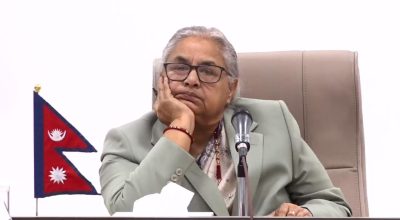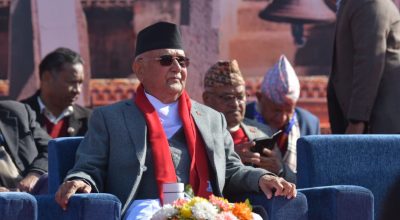
Washington, Sept 22 (Reuters): The State Department said Thursday that it was withdrawing $100 million in aid to Afghanistan and withholding another $60 million because of government corruption, a week before an election in which President Ashraf Ghani hopes to win a second term in office.
Asked about the statement announcing the cuts and what message it was sending to Ghani, Secretary of State Mike Pompeo said only that “we want free and fair elections.”
“We’re going to do everything we can to support them, and we need every actor in the region — every leader, every citizen in Afghanistan — to work toward that end,” he said.
U.S. negotiators had hoped Ghani would postpone the vote while they were negotiating with the Taliban. But those talks were suspended this month by President Trump, after an American soldier was killed in a Taliban attack.

Taken together, the ostensibly separate actions left uncertain the administration’s strategy for achieving a political solution to the 18-year war and the U.S. troop withdrawals Trump has promised.
In a House Foreign Affairs Committee hearing on Afghanistan policy, lawmakers from both parties pressed acting assistant secretary of state Alice Wells for a plan and expressed concern over what they said was the administration’s failure to keep Congress informed.
“Trump ran on a campaign of getting the U.S. out of endless wars, of getting us out of dumb wars in the Middle East,” Rep. Ted Lieu (D-Calif.) said. “He has failed to deliver on that promise. In fact, he has increased troops in Afghanistan by approximately 70 percent.”
In late 2017, on the recommendation of his national security team, Trump increased the U.S. troop presence there from around 8,600 to around 14,000. The additional 5,400 were to be withdrawn as part of a U.S.-Taliban agreement that was due to be signed last week after nearly a year of negotiations. In canceling the signing, which Trump had proposed be held at Camp David, he said that the talks were “dead.”
Wells told the committee, however, that they had been “suspended.”
The open hearing was preceded by a closed committee session with Zalmay Khalilzad, the administration’s chief negotiator. His appearance followed a clash in which the administration refused to allow him to appear, and the committee issued a subpoena compelling his testimony.
The subpoena was withdrawn Wednesday after it was agreed that Khalilzad could speak to lawmakers in private.

Rep. Mike McCaul of Texas, the ranking Republican on the panel, described the Khalilzad session as “robust and informative” and said that he and Chairman Eliot L. Engel (D-N.Y.) “stand unified” in demanding that the committee be permitted to exercise its oversight responsibilities.
“We do deserve that respect,” McCaul said.
Since the cancellation of the Taliban talks, Khalilzad has been given no new instructions on whether or how to proceed.
In conversations with lawmakers, he has outlined three remaining options. The first is to try to win a military victory in Afghanistan, something that has eluded U.S. forces, once numbering 100,000 troops, for nearly two decades.
The other options are to continue with plans to withdraw 5,400 troops — the partial withdrawal agreed in the unsigned deal with the Taliban — without an agreement, or to return to the negotiating table.
For its part, the Taliban — whose oft-stated demand is the eventual withdrawal of all foreign forces — has indicated it is prepared to return to the negotiating table.
In exchange for the initial partial withdrawal, the agreement included a Taliban pledge to sever relations with al-Qaeda, and to ensure that none of the territory it controls — now more than 50 percent of Afghanistan — would be used for terrorism activities directed at the United States or its partners. The deal was also to lead to direct talks later this month between the Afghan government and the militants, with a cease-fire at the top of the agenda.
While Pompeo favored the deal, some of Trump’s closest advisers and confidantes opposed it as offering little to the United States. While the president cited the U.S. service member’s death in a Taliban suicide attack as the reason for backing away from the deal — which he had tentatively approved just two weeks earlier — he was believed to be heavily influenced by broader criticism of its terms.
Ghani had agreed to attend the direct talks, which were to be held in Oslo on Sept. 23, but shared congressional concern that Khalilzad had kept him out of the negotiations loop, and had pressed to postpone the Sept. 28 election in which Ghani has been the overwhelming favorite to win.
The aid cuts announced Thursday coincided with U.S. long-standing ire with Ghani over a range of issues, as well as concern that aid money has been siphoned off to support his campaign and possibly fund a fraudulent vote. Successive U.S. administrations have accused successive Afghan governments of corruption in the distribution of an estimated $131 billion in nonmilitary assistance since 2002.
The State Department said that “the U.S. government is returning about $100 million to the U.S. Treasury that was intended that was intended for a large energy infrastructure project,” a hydroelectric dam and transmission stations to provide power in the southern part of the country.
The statement said the project would be continued using “a U.S. government ‘off-budget’ mechanism given the Afghan government’s inability to transparently manage U.S. Government resources.”
State Department officials declined to provide further explanation, but an official, authorized to speak only on the condition of anonymity, said that “we expect our partners to demonstrate a clear commitment to fight corruption, to serve their people, and to maintain mutual trust. Leaders and institutions that fail to meet this standard should be held accountable. ”
The withheld $60 million had been designated for Afghanistan’s National Procurement Authority. “Lack of transparency surrounding procurement decisions” by the agency “is also a cause for great concern,” the department said. The assistance was being withheld “due to the government’s failure to meet benchmarks for transparency and accountability in public financial management.”












